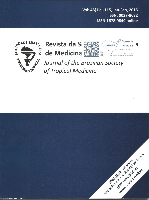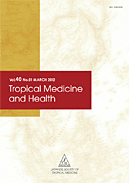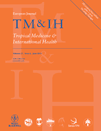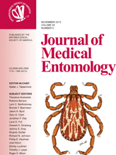
Revista da Sociedade Brasileira de Medicina Tropical
Scope & Guideline
Empowering public health through impactful research.
Introduction
Aims and Scopes
- Infectious Diseases and Parasitology:
The journal publishes extensive research on various infectious diseases, including malaria, leishmaniasis, tuberculosis, and arboviruses. It covers both clinical and epidemiological aspects, aiming to inform treatment protocols and public health strategies. - Public Health and Epidemiology:
Research that examines public health concerns, disease burden, and epidemiological trends in Brazil is a core focus. This includes studies on disease outbreaks, health care access, and interventions to improve health outcomes in vulnerable populations. - Vector-borne Diseases:
The journal emphasizes studies related to vector-borne diseases, particularly those transmitted by triatomines, mosquitoes, and other vectors. Research includes vector ecology, control strategies, and the impact of climate change on disease transmission. - Clinical Case Reports and Reviews:
The journal features clinical case reports that provide insights into rare or unusual presentations of diseases, as well as systematic reviews that synthesize current knowledge on specific topics, contributing to clinical practice. - Innovative Diagnostic and Treatment Approaches:
There is a focus on research that explores new diagnostic tools, treatment options, and preventive measures for tropical diseases, including the application of molecular biology techniques and novel therapeutics.
Trending and Emerging
- Impact of Climate Change on Disease Patterns:
There is an increasing focus on how climate change affects the incidence and spread of infectious diseases, particularly vector-borne diseases like dengue and malaria. This trend highlights the need for adaptive public health strategies. - COVID-19 and its Implications:
Research related to COVID-19, including its clinical manifestations, long-term effects, and co-infections with other diseases, has surged. This reflects an urgent response to the pandemic's impact on public health. - Social Determinants of Health:
Emerging studies are increasingly linking disease prevalence and outcomes to social determinants of health, emphasizing the importance of addressing socioeconomic factors in disease prevention and health care access. - Mental Health in Infectious Disease Contexts:
There is a growing recognition of the mental health impacts associated with infectious diseases, particularly in the context of pandemics and chronic illness, leading to more research in this area. - Antimicrobial Resistance:
Research on antimicrobial resistance is gaining traction, especially concerning hospital-acquired infections. This trend underscores the importance of monitoring resistance patterns and developing effective treatment protocols.
Declining or Waning
- Traditional Tropical Diseases:
Research on well-established tropical diseases, such as schistosomiasis, has seen a decrease, possibly due to successful control measures or a shift towards emerging diseases and public health challenges. - Zoonotic Diseases:
There has been a noticeable decline in studies specifically targeting zoonotic diseases, which were previously a significant focus. This may reflect a broader interest in human-centric health issues over zoonotic transmission pathways. - Neglected Tropical Diseases (NTDs):
Although still important, the emphasis on NTDs appears to be waning in favor of more broadly impactful diseases that affect larger populations or have higher mortality and morbidity rates. - Chronic Infectious Diseases:
Research on chronic infectious diseases, such as leprosy and some forms of chronic viral infections, has decreased. This may indicate a shift towards acute and more prevalent health threats.
Similar Journals

Tropical Medicine and Health
Innovating solutions for infectious challenges in tropical regions.Tropical Medicine and Health is a prestigious open-access journal published by BMC that serves as a vital platform for researchers and health professionals focusing on the fields of tropical medicine, infectious diseases, and public health. With an ISSN of 1348-8945 and an E-ISSN of 1349-4147, the journal has established itself in the academic community since its inception in 2004, bridging the gap between research and real-world applications in managing tropical diseases. Recognized for its quality, it holds a commendable Q2 ranking in both the Infectious Diseases and Public Health, Environmental and Occupational Health categories, positioned in the 2023 Scopus rankings within the 85th and 74th percentiles, respectively. Researchers can access high-quality, peer-reviewed articles that contribute significantly to advancing knowledge in the field. With a commitment to fostering open scientific dialogue, Tropical Medicine and Health is not just a journal, but a collaborative space for researchers, students, and practitioners working to improve health outcomes in tropical regions worldwide.

TROPICAL MEDICINE & INTERNATIONAL HEALTH
Uniting voices in the fight against tropical diseases.Tropical Medicine & International Health is a distinguished journal published by Wiley, dedicated to the exploration and dissemination of cutting-edge research in the fields of infectious diseases, parasitology, and public health. With a robust open-access option, the journal facilitates the widespread sharing of information critical to addressing health issues in tropical and international settings. Since its inception in 1996, it has established a significant presence in the academic community, as indicated by its impressive ranking in various Scopus categories, notably positioned in the Q1 quartile for Parasitology and Q2 for both Infectious Diseases and Public Health, reflecting its high influence within these domains. The journal's commitment to advancing knowledge on health challenges prevalent in tropical environments makes it an invaluable resource for researchers, healthcare professionals, and students alike who are dedicated to improving global health outcomes.

MALARIA JOURNAL
Empowering global health with innovative malaria insights.MALARIA JOURNAL, published by BMC, is a leading open-access journal dedicated to the advancement of research in the field of malaria and related infectious diseases. Since its inception in 2002, this journal has established itself as a significant resource for the global scientific community, covering a wide range of topics, including epidemiology, pathology, treatment, and prevention strategies for malaria. With an impressive Q1 ranking in both Infectious Diseases and Parasitology categories as of 2023, the journal is committed to fostering high-quality research that contributes to the understanding and control of malaria. As an open-access platform, it ensures that vital findings and insights are freely accessible to researchers, practitioners, and students worldwide, facilitating collaboration and informing public health strategies. The journal's relevance is underscored by its competitive Scopus rankings, which further highlight its impact in the realms of Immunology, Microbiology, and Medicine. Join the community of scholars and practitioners dedicated to combating one of the world's most pressing health challenges.

Current Research in Parasitology & Vector-Borne Diseases
Advancing knowledge in parasitology and vector-borne diseases.Current Research in Parasitology & Vector-Borne Diseases, published by ELSEVIER, is an influential journal dedicated to advancing the understanding of parasitology and vector-borne diseases. With an ISSN of 2667-114X, this journal is highly esteemed in the field, holding a prestigious Q1 quartile ranking in categories such as Animal Science and Zoology, Insect Science, and Parasitology, as well as a notable Q2 ranking in Virology for 2023. The journal's focus spans a crucial intersection of disciplines, offering a platform for innovative research that directly addresses global health challenges posed by parasites and vectors. Researchers benefit from its robust open-access model, which facilitates unrestricted dissemination of knowledge, making essential findings accessible to a wider audience. The journal continues to play a pivotal role in fostering scholarly dialogue and interdisciplinary collaboration within the scientific community, serving as a vital resource for professionals, students, and academicians interested in the dynamic and evolving field of parasitology.

LANCET INFECTIOUS DISEASES
Empowering Healthcare Through Rigorous ResearchLANCET INFECTIOUS DISEASES is a premier journal published by Elsevier Science Ltd, dedicated to disseminating high-quality research and comprehensive reviews in the field of infectious diseases. Since its inception in 2001, the journal has become a pivotal resource in the medical community, recognized for its rigorous peer-review process and impactful contributions to public health. With an impressive Scopus rank of #2 out of 344 in the category of Medicine - Infectious Diseases, it consistently ranks in the 99th percentile, highlighting its importance and influence in shaping clinical and epidemiological research. The journal's commitment to advancing knowledge in infectious diseases is underscored by its Q1 quartile designation in 2023, affirming its status as a leading academic outlet. Although not an open-access journal, LANCET INFECTIOUS DISEASES provides essential insights for researchers, healthcare professionals, and students, bridging the gap between cutting-edge research and practical application in an increasingly interconnected world.

Egyptian Journal of Bronchology
Championing accessible research for respiratory innovation.Egyptian Journal of Bronchology, published by SPRINGER, is a premier open access journal dedicated to advancing the field of respiratory medicine, particularly focusing on bronchial diseases and disorders. Since its establishment in 2013, this journal has provided a platform for the dissemination of high-quality research articles, systematic reviews, and clinical studies, making significant contributions to the understanding and management of bronchological conditions. With its commitment to open access, the journal ensures that research findings are readily available to a global audience, fostering knowledge exchange among researchers, healthcare professionals, and students alike. The Egyptian Journal of Bronchology serves as an essential resource in the field, reflecting a growing emphasis on accessible scientific knowledge and collaborative research in respiratory health.

JOURNAL OF MEDICAL ENTOMOLOGY
Bridging entomology and infectious disease research.JOURNAL OF MEDICAL ENTOMOLOGY, published by Oxford University Press, is a prestigious journal dedicated to advancing the field of medical entomology, a critical area of study that explores the intersection of insect biology and public health. With an ISSN of 0022-2585 and an E-ISSN of 1938-2928, the journal features high-quality research articles and reviews that delve into the impacts of insect vectors on infectious diseases and parasitology, making it an essential resource for professionals and researchers alike. The journal has garnered significant recognition in the academic community, currently ranking in the top quartiles: Q2 in Infectious Diseases, Q1 in Insect Science, Q2 in Parasitology, and Q1 in Veterinary (miscellaneous), reflecting its influential contributions to these disciplines. With its comprehensive coverage of topics spanning across medical entomology and veterinary sciences, authors and readers will find a platform rich in valuable insights and data. The journal's long-standing history, dating back to its inception in 1964, ensures a legacy of excellence that continues through 2024 and beyond. While it does not currently offer open access, researchers are highly encouraged to engage with its content to foster a deeper understanding of the crucial role that insects play in human and animal health.

Journal of Infection in Developing Countries
Advancing global health through infectious disease research.Journal of Infection in Developing Countries, published by J INFECTION DEVELOPING COUNTRIES, is a premier open-access journal dedicated to advancing research in the fields of infectious diseases, microbiology, parasitology, and virology, particularly within the context of developing nations. Established in 2007 and actively disseminating knowledge since 2008, this journal aims to bridge the gap between researchers and practitioners by providing a platform for high-quality, peer-reviewed articles that address the unique challenges faced in these regions. With an ISSN of 1972-2680 and a robust HIndex showcasing its growing influence, JIDC has attained a Q3 category ranking in several disciplines as of 2023, indicating its crucial role in shaping ongoing discourse in public health. As an open-access publication, it ensures that vital research is accessible to all, fostering collaboration and innovation in infectious disease management and control.

ISRAEL JOURNAL OF VETERINARY MEDICINE
Transforming Veterinary Science with Cutting-Edge ResearchThe Israel Journal of Veterinary Medicine, published by the Israel Veterinary Medical Association, serves as a vital resource for researchers, professionals, and students in the fields of veterinary medicine and animal science. With a commitment to advancing knowledge across diverse veterinary disciplines, this journal plays a crucial role in disseminating significant findings and innovations that influence both local and global veterinary practices. Although it currently holds a Q4 ranking in both the Animal Science and Zoology and Veterinary (miscellaneous) categories, the journal's open access policy, enabling free availability of articles, aspires to increase its accessibility and engagement among the academic community. The journal's convergence of research from 2007 to 2024 showcases its dedication to continuously contributing to the evolving landscape of veterinary science.

Biomedica
Connecting researchers to drive biomedical discoveries.Biomedica is a distinguished journal published by the Instituto Nacional de Salud in Colombia, dedicated to advancing knowledge within the fields of biochemistry, genetics, molecular biology, and general medicine. Since its inception in 1981, this Open Access journal has embodied a commitment to disseminating high-quality research, ensuring free and universal access to its published works. With an impressive Scopus Ranking—273rd out of 636 in Medicine and 148th out of 221 in Biochemistry, Genetics and Molecular Biology—Biomedica holds a Q3 category in both disciplines as of 2023, reflecting its growing impact and relevance in the scientific community. The journal welcomes contributions that further our understanding and lead to advancements in healthcare and biological sciences, serving as a critical resource for researchers, professionals, and students alike. The journal operates within a continuous publication model from 2001 to 2024, enriching the academic landscape with contemporary findings and fostering collaboration within the biomedical field.